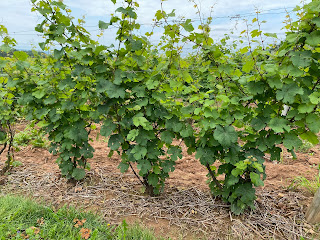There
are a lot of things happening in the vineyards and lots of questions on vine
balance or should I keep crop on the vine to slow vegetative growth, what shoot
thinning should I be doing, sucker training, and weed control. A lot to cover!
Vine
Balance and more
Many are
commenting on some signs of highly vigorous shoot growth and the question of
trying to reduce vigour and/or the use of hedging this year. Excessive shoot growth often leads to the
formation of bull wood which has less winter hardiness and poor maturation for
the winter ahead. This is to reinforce
the no fertilization suggestion I have been making all year and discussed in an
earlier blog.
Should I
be leaving fruit on shoots to help slow them down?
The
quick answer is yes but only until veraison. Then drop the crop. If there is no
intention of harvesting this year, the fruit left behind becomes a prime source
for botrytis infection that can not only rot and lead to other problems such as
fruit flies and sour rot and becomes a source of pests for any fruit in nearby
blocks that you intend to harvest. It
may cost to do this but losing nearby crops intended to be picked is a double
whammy.
 |
| Fruit clusters on Marquette. |
 |
| Fruit clusters on L'Acadie Blanc. |
What
about hedging and deleafing?
If the
shoots are growing upwards and then flopping over, go ahead and hedge. In all
cases whether there is crop present or no crop to be harvested. Lateral shoots
will develop that will help the plant manufacture carbohydrates for the trunk
and roots and winter storage and if fruit is present will help fill the crop.
The big rule of thumb is no hedging any closer than 30 days to anticipated
harvest (if crop is present) and no closer than 45 days from when normal fist
frost occurs! For early ripening grapes
this is no later than mid-August and for everything else absolutely no later
first week of September. If you are unsure and think you might need it, do it!
Do not worry about the tops of vines looking shaggy going into winter – those
“carrot tops” are incredibly efficient at capturing sunlight and helping ripen
fruit to be harvested and adding much needed energy to winter reserves.
 |
| Shoots of Baco Noir growing upwards and starting to bend over. |
For
cultivars to be harvested, leaf removal will help expose fruit to sunlight for
ripening, reduce disease pressure and will make harvesting much easier as I
suspect some blocks will be hand picked that might have been machine harvested
in prior years. I am a bit wary of machine harvesting in reduced crop vineyards
where growth is not strong AND where suckers are being brought up for
retraining. Some harvester lower catch
paddles can damage these softer suckers you have spent all year training. This
is an individual grower choice and the skill of the harvester operator. Sometimes with light crops harvesters are
operated too quickly down throws in an effort to reduce time spent in the
vineyards. Weakened vines and young sucker growth are sometimes injured as a
result.
What about
suckers I am training up?
Now that August is here, it is appropriate to
think about getting suckers mature for winter survival. One approach that has been really helpful has
been to remove leaves close to the ground on suckers. If the suckers have
reached 18 inch or so of growth remove all the leaves near the ground up about
10 to 12 inches. Removing these leaves
does a couple of things. It helps you easily identify the suckers for working
around the plant and tying them together so they grow tighter to the old trunks
will give you a straighter and strong trunk for use in the future. Secondly
removing those leaves avoids messy disease problems and inoculum source later
in the season. Thirdly exposure to sunlight will help these soft shoots lignify
earlier in the fall and harden off and acclimate better going into the winter.
This will make for better choices in spring 2024 for choosing retrained trunks!
 |
| Riesling with a lot of sucker growth. |
Should I
do some shoot removal?
Where
the head of the vine is clumped with many shoots and crowding is obvious, yes
go ahead and remove the extra shoots to open the head up. Crowded heads make
disease control far harder and may impact on maturation of the shots/canes you
are looking to keep for 2024. Opening up the head leads to better shoot and
vine maturation for the fall and winter and also makes pruning easier in
2024. A little extra effort now will pay
dividends in the future.
 |
| L'Acadie Blanc with crowded head growth. |
Weed control – 2023 not a fun year for weed control!
This has
been the bane of many growers this year. Weed control immediately around the
vine, especially younger vines is always a good thing. With suckers present,
removing weeds helps fungicide coverage as even a green cane (until it
lignifies) can be infected by downy and powdery mildew. Most weeds change the
microclimate around the vine to high humidity and slow drying conditions which
are ideal for downy and powdery mildew which when infecting the wood can lead
to reduce cane hardiness and bud survival.
 |
| Weeds growing around grapevines. |
So, you
can see all of the above are about vine health, maturation, and bud survival to
some degree. If you have
questions, send them along to viticulture@perennia.ca and we will work to get them answered!
